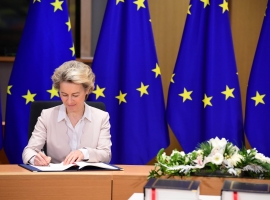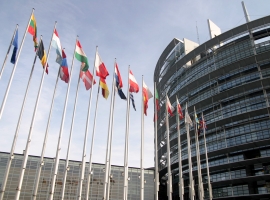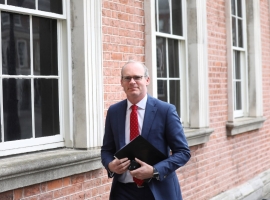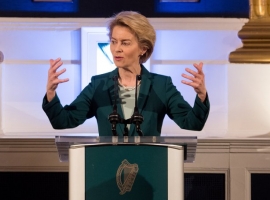
Frankfurt and Paris are set to see a trickle rather than a wave of London bankers arrive in 2018, with the prospect of a softer Brexit discouraging them from leaving Britain immediately, executives and lobbyists say.
Both cities had been positioned to benefit as Britain prepares to leave the European Union, prompting London banks to seek a foothold elsewhere within the bloc in order to continue taking full advantage of the EU single market.
But conciliatory signals from British Prime Minister Theresa May and progress in talks with Michel Barnier, the European Commissioner's chief negotiator, have prompted some banks to delay large staff moves, at least for now.
Frankfurt's chief promoter, Hubertus Vaeth, had expected up to 6,000 new arrivals in Germany's financial capital this year in the event of a hard Brexit. Vaeth said he has now pared back that assessment to less than 1,000.
The small city had been the most popular among banks looking for an EU base. But optimism that Frankfurt could profit has been dampened by the prospect of a Brexit compromise.
"There will be a reluctant, minimal move," said Vaeth, though he cautioned that this could change in coming years.
Speaking to an audience of financiers at Deutsche Boerse, the Frankfurt stock exchange, on Monday, Germany's European Union commissioner, Guenther Oettinger, raised the possibility that Britain might not leave the EU at all.
"That would be no loss, quite to the contrary," said Oettinger, an ally of German Chancellor Angela Merkel.
The developments have prompted a change of heart at Deutsche Bank, which had originally examined moving up to 4,000 staff from London. It will now initially shift less than 200 jobs, according to one person with knowledge of the matter.
That is in keeping with remarks made by Stefan Hoops, an executive at the bank, who said this month: "Not thousands will move from London, but rather hundreds." The group has more than 8,000 staff in London.
The larger initial figure was used in a Reuters survey last September that predicted around 10,000 finance jobs could be shifted out of Britain or created overseas, suggesting this may not be reached in 2018.
In Paris, a similar picture is emerging.
France has stepped up efforts to attract London banks preparing for Brexit to Paris after the election of President Emmanuel Macron, who has begun to make labor law more flexible and has offered some tax cuts.
Among most recent announcements, Goldman Sachs Chief Executive Lloyd Blankfein said in November the bank would have hubs in Frankfurt and Paris after Brexit and that it would be up to staff to decide where they want to move to from London.
But one person familiar with the Wall Street bank's strategy said that only dozens of staff might move initially.
Even French bankers based in London are not rushing to return.
"There is no hurry for us," said Frederic Oudea, chief executive of Societe Generale, when asked about moving staff from London to Paris. France's third-largest bank has said that it plans to move up to 400 people.
"The good thing is that there has been an agreement on a divorce settlement which means that there is more time," he told Reuters at the World Economic Forum in Davos. "At this stage we have not moved people. We can wait to have more clarity."
Florence Soule de Lafont, a partner at headhunter Heidrick & Struggles, said banks would be unlikely to follow their initial schedule to transfer certain activities by September 2018, given that they believed Brexit negotiation would now take more time.
"Big players continue to advance on their strategies, plans for the future positioning in Europe ... but with a feeling that there is less pressure," said Jean-Louis Laurens, an "ambassador" for the French asset management sector.
"There is still too much uncertainty for people to make firm decisions."
The final outcome of the talks is anything but certain, and a hard Brexit -- in which the UK would lose full access to the EU single market -- cannot be ruled out.
Spain's foreign affairs minister Alfonso Dastis told Reuters TV in Davos on Wednesday that he felt the outcome would be "closer to a hard Brexit."
But positive signals from regulators and politicians in Britain have nonetheless encouraged banks.
Late last year, the Bank of England said it intended to spare them costly extra capital requirements after Brexit -- an important move for international banks.
A thaw in relations between Britain's financial center, the City of London, and British politicians, some of whom had been disinterested in or even hostile to the sector, has also helped.
Speaking from Davos, one senior banker said he had been reassured by a meeting he attended with May in Downing street this month, where he was told that the future of financial services was a core government priority.
This was in stark contrast to her stance a year earlier when she met senior bankers in Davos: "The government focus on the need to safeguard the city of London has increased." (Reuters)
Source: www.businessworld.ie

















